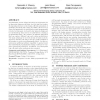Free Online Productivity Tools
i2Speak
i2Symbol
i2OCR
iTex2Img
iWeb2Print
iWeb2Shot
i2Type
iPdf2Split
iPdf2Merge
i2Bopomofo
i2Arabic
i2Style
i2Image
i2PDF
iLatex2Rtf
Sci2ools
100
Voted
DAC
2004
ACM
2004
ACM
Design automation for mask programmable fabrics
Programmable circuit design has played an important role in improving design productivity over the last few decades. By imposing structure on the design, efficient automation of synthesis, placement and routing is possible. We focus on a class of programmable circuits known as mask programmable circuits. In this paper, we describe key issues in design and tool methodology that need to be addressed in creating a programmable fabric. We construct an efficient design flow that can explore different logic and routing architectures. The main advantage of our work is that we tailor tools designed for standard cell design, that are readily available in the market, to work on a programmable fabric. Our flow requires some additional software capability. A special router that understands programmable routing constructs to complete connections is described. In addition, a tool that packs logic efficiently after synthesis is also presented. Categories and Subject Descriptors: B.7.1 [Hardware]: IN...
DAC 2004 | Design Automation | Mask Programmable Circuits | Programmable Circuit Design | Programmable Routing Constructs |
Related Content
| Added | 13 Nov 2009 |
| Updated | 13 Nov 2009 |
| Type | Conference |
| Year | 2004 |
| Where | DAC |
| Authors | Narendra V. Shenoy, Jamil Kawa, Raul Camposano |
Comments (0)

